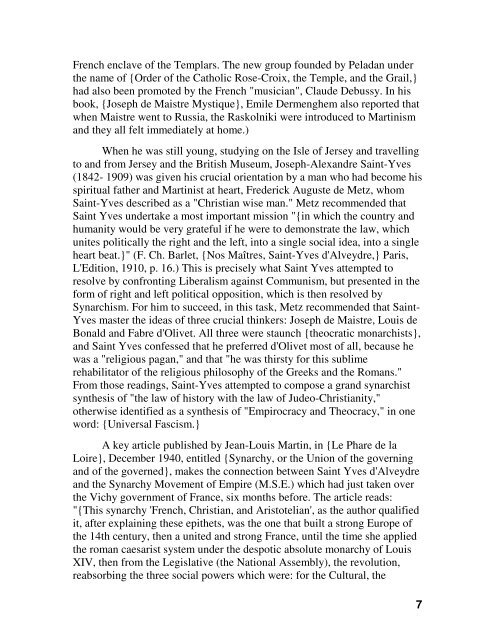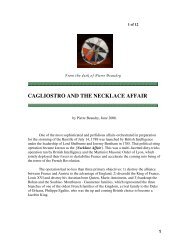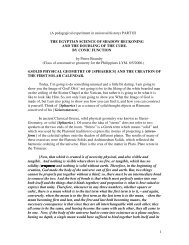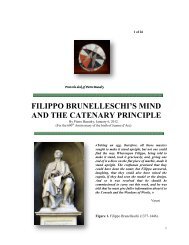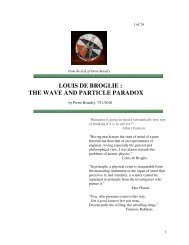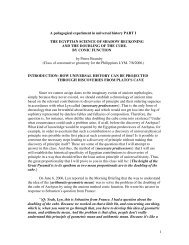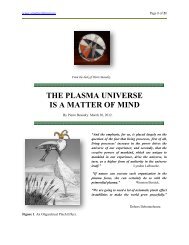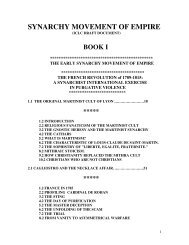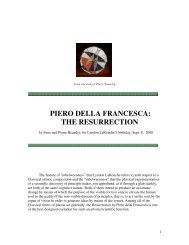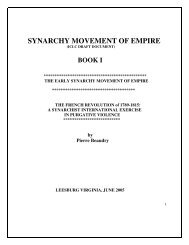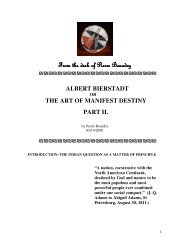synarchy movement of empire book ii - Pierre Beaudry's Galactic ...
synarchy movement of empire book ii - Pierre Beaudry's Galactic ...
synarchy movement of empire book ii - Pierre Beaudry's Galactic ...
Create successful ePaper yourself
Turn your PDF publications into a flip-book with our unique Google optimized e-Paper software.
French enclave <strong>of</strong> the Templars. The new group founded by Peladan under<br />
the name <strong>of</strong> {Order <strong>of</strong> the Catholic Rose-Croix, the Temple, and the Grail,}<br />
had also been promoted by the French "musician", Claude Debussy. In his<br />
<strong>book</strong>, {Joseph de Maistre Mystique}, Emile Dermenghem also reported that<br />
when Maistre went to Russia, the Raskolniki were introduced to Martinism<br />
and they all felt immediately at home.)<br />
When he was still young, studying on the Isle <strong>of</strong> Jersey and travelling<br />
to and from Jersey and the British Museum, Joseph-Alexandre Saint-Yves<br />
(1842- 1909) was given his crucial orientation by a man who had become his<br />
spiritual father and Martinist at heart, Frederick Auguste de Metz, whom<br />
Saint-Yves described as a "Christian wise man." Metz recommended that<br />
Saint Yves undertake a most important mission "{in which the country and<br />
humanity would be very grateful if he were to demonstrate the law, which<br />
unites politically the right and the left, into a single social idea, into a single<br />
heart beat.}" (F. Ch. Barlet, {Nos Maîtres, Saint-Yves d'Alveydre,} Paris,<br />
L'Edition, 1910, p. 16.) This is precisely what Saint Yves attempted to<br />
resolve by confronting Liberalism against Communism, but presented in the<br />
form <strong>of</strong> right and left political opposition, which is then resolved by<br />
Synarchism. For him to succeed, in this task, Metz recommended that Saint-<br />
Yves master the ideas <strong>of</strong> three crucial thinkers: Joseph de Maistre, Louis de<br />
Bonald and Fabre d'Olivet. All three were staunch {theocratic monarchists},<br />
and Saint Yves confessed that he preferred d'Olivet most <strong>of</strong> all, because he<br />
was a "religious pagan," and that "he was thirsty for this sublime<br />
rehabilitator <strong>of</strong> the religious philosophy <strong>of</strong> the Greeks and the Romans."<br />
From those readings, Saint-Yves attempted to compose a grand synarchist<br />
synthesis <strong>of</strong> "the law <strong>of</strong> history with the law <strong>of</strong> Judeo-Christianity,"<br />
otherwise identified as a synthesis <strong>of</strong> "Empirocracy and Theocracy," in one<br />
word: {Universal Fascism.}<br />
A key article published by Jean-Louis Martin, in {Le Phare de la<br />
Loire}, December 1940, entitled {Synarchy, or the Union <strong>of</strong> the governing<br />
and <strong>of</strong> the governed}, makes the connection between Saint Yves d'Alveydre<br />
and the Synarchy Movement <strong>of</strong> Empire (M.S.E.) which had just taken over<br />
the Vichy government <strong>of</strong> France, six months before. The article reads:<br />
"{This <strong>synarchy</strong> 'French, Christian, and Aristotelian', as the author qualified<br />
it, after explaining these epithets, was the one that built a strong Europe <strong>of</strong><br />
the 14th century, then a united and strong France, until the time she applied<br />
the roman caesarist system under the despotic absolute monarchy <strong>of</strong> Louis<br />
XIV, then from the Legislative (the National Assembly), the revolution,<br />
reabsorbing the three social powers which were: for the Cultural, the<br />
7


